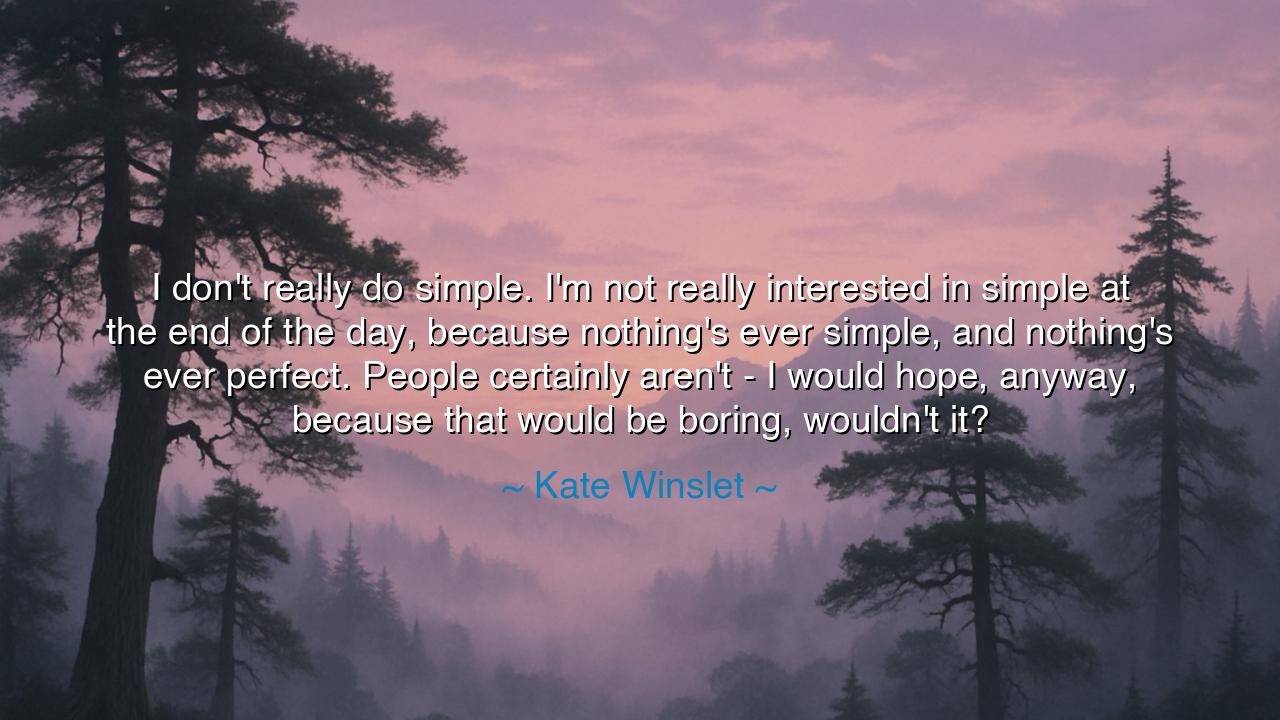
I don't really do simple. I'm not really interested in simple at
I don't really do simple. I'm not really interested in simple at the end of the day, because nothing's ever simple, and nothing's ever perfect. People certainly aren't - I would hope, anyway, because that would be boring, wouldn't it?






In the candid and insightful words of Kate Winslet, an artist of depth and truth, there burns a reflection on the very nature of existence: “I don’t really do simple. I’m not really interested in simple at the end of the day, because nothing’s ever simple, and nothing’s ever perfect. People certainly aren’t — I would hope, anyway, because that would be boring, wouldn’t it?” These are not the words of a cynic, but of a woman who has looked upon life with clear eyes and an open heart. Winslet’s statement is not merely about art, but about the complexity of being human — the understanding that beauty lies not in perfection, but in imperfection; not in simplicity, but in the layered truths that make us alive.
The origin of this quote can be found in Winslet’s long devotion to portraying authentic characters — women who bleed, doubt, and love fiercely. Throughout her career, from Titanic to Revolutionary Road to The Reader, she has sought roles that expose the messy truths of emotion and choice. Her craft reflects a philosophy of life itself: that to live honestly is to embrace contradiction, to reject the illusion of perfection, and to find meaning within imperfection. Thus, her declaration, “I don’t really do simple,” becomes both an artistic creed and a moral one — a refusal to live on the surface of things.
In saying that “nothing’s ever simple,” Winslet reminds us that life, like art, resists reduction. Every person is a tapestry of light and shadow, hope and fear, love and loss. To pretend otherwise is to deny our own humanity. The ancients knew this truth well — the Greeks spoke of the tragic hero, a being both noble and flawed, whose greatness came not from purity but from struggle. Achilles, torn between glory and peace; Odysseus, longing for home yet bound by pride; these figures endure because they mirror the complexity within us all. Perfection, Winslet says, is not only impossible — it is dull. It lacks the movement, the tension, the divine chaos that gives life its fire.
Consider also the story of Leonardo da Vinci, who, though hailed as a genius, left countless works unfinished. His notebooks are filled with sketches that trail off, ideas that never solidified. Yet it was this very restlessness — this refusal to settle for simplicity — that made his mind eternal. Like Winslet, Leonardo understood that truth is rarely clean or complete; it is born of uncertainty, curiosity, and the willingness to dwell in mystery. To seek simplicity in life or art is to flee the wonder of the unknown. Complexity, by contrast, is the realm where wisdom and beauty are forged.
In her rejection of perfection, Winslet also speaks of humility and compassion. To acknowledge that “people certainly aren’t perfect” is to forgive others — and oneself. Perfection breeds judgment, but imperfection breeds empathy. When we see one another not as polished statues but as living, growing beings, we become gentler, wiser, more connected. The ancient philosophers spoke of eudaimonia — a life of flourishing — and they knew that such a life required the courage to engage with imperfection, to find harmony not in flawlessness but in the balance of our contradictions. Winslet’s words call us back to that ancient wisdom: that what makes us human is not our sameness, but our complexity.
Moreover, her question — “because that would be boring, wouldn’t it?” — is not idle jest but profound insight. She reminds us that boredom is the child of simplicity, while fascination and passion are born of struggle and depth. To live an interesting life, one must dare to feel deeply, to risk failure, to confront the complexity within oneself and others. Love is not simple. Art is not simple. Growth is not simple. But it is precisely their difficulty that makes them worthwhile. Winslet’s philosophy is that of the artist, the philosopher, and the seeker — to walk willingly into the tangled forest of being, knowing that only through complexity does one reach the light of understanding.
So, my children of the future, take this teaching to heart: do not chase simplicity when life offers you complexity, for it is in the intricate, imperfect weave of your days that your true beauty lies. Do not fear contradiction; embrace it as the mark of a living soul. Strive not to be perfect, but to be whole — honest in your flaws, radiant in your striving. As Kate Winslet teaches through her words and her art, simplicity may bring comfort, but complexity brings meaning. And in a world that often seeks to flatten the human spirit into tidy lines, dare instead to live with texture, depth, and truth.
For in the end, perfection is static, but imperfection is alive. And it is life — unpredictable, wondrous, and unrefined — that is the greatest story ever told.






AAdministratorAdministrator
Welcome, honored guests. Please leave a comment, we will respond soon